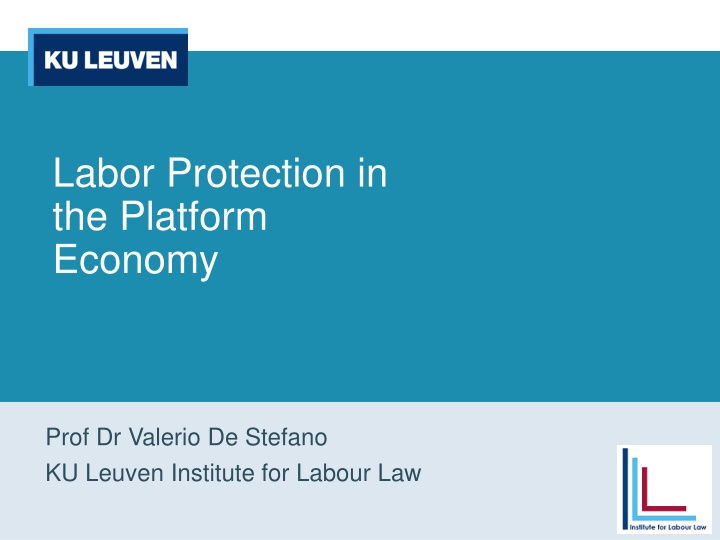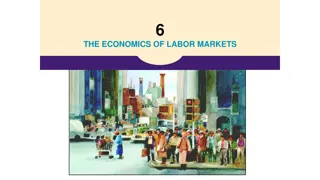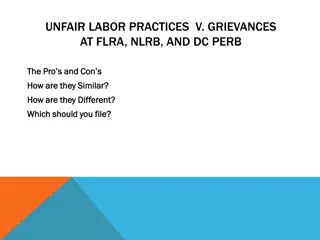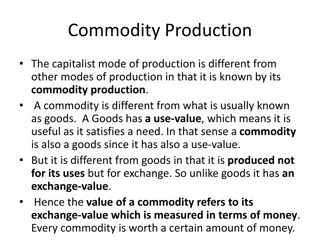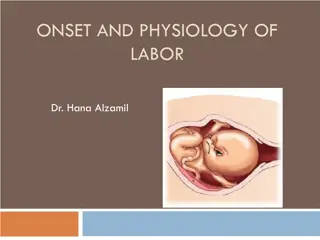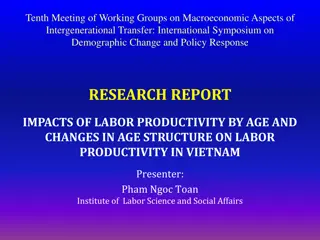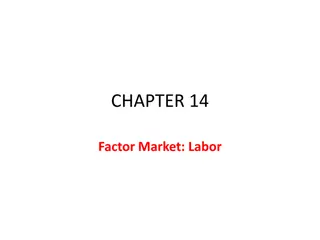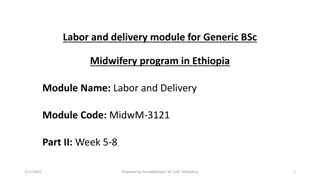Labor Protection in the Platform Economy: Challenges and Opportunities
Labor protection in the platform economy presents a complex landscape of risks and benefits, from the rise of on-demand work to the concept of humans-as-a-service. Exploring common risks for workers' rights such as wage theft and elusion of minimum wages, this discussion sheds light on the evolving dynamics of modern work arrangements.
Download Presentation

Please find below an Image/Link to download the presentation.
The content on the website is provided AS IS for your information and personal use only. It may not be sold, licensed, or shared on other websites without obtaining consent from the author.If you encounter any issues during the download, it is possible that the publisher has removed the file from their server.
You are allowed to download the files provided on this website for personal or commercial use, subject to the condition that they are used lawfully. All files are the property of their respective owners.
The content on the website is provided AS IS for your information and personal use only. It may not be sold, licensed, or shared on other websites without obtaining consent from the author.
E N D
Presentation Transcript
Labor Protection in the Platform Economy Prof Dr Valerio De Stefano KU Leuven Institute for Labour Law
The on-demand/platform economy: what are we talking about ? Crowdemployment (Amazon Turk, Clickworker, Crowdflower, Microtask) Work on-demand via apps (Uber, Deliveroo, TaskRabbit, Handy, Wonolo) Profound differences: Virtual/ non-virtual work Global/ local execution of work Enormous differences also among crowdwork and on- demand platforms, e.g. Methods of adjudication Payment (bid/defined rate) Complexity of task and control over performance Specialised vs. general platforms
Crowdwork and work on-demand: are they more similar than we know? Opportunities: Enhanced way of matching supply and demand of labour using online technologies Reduce transactions costs and market frictions by facilitating outsourcing to individuals Customer-oriented Create job opportunities with some flexible schedule Increase flexibility based on a pay-as-you-go workforce
Humans-as-a-service Before the Internet, it would be really difficult to find someone, sit them down for ten minutes and get them to work for you, and then fire them after those ten minutes. But with technology, you can actually find them, pay them the tiny amount of money, and then get rid of them when you don t need them anymore (L. Biewald, Crowdflower) Access to Humans-as-a-service (J. Bezos, Amazon)
What are the common risks? Humans-as-a-service and commodification of labour; risks of: Dehumanized perception of workers with both theoretical and practical risks: Devaluation and disguising of work ( gigs , tasks , services , favours or microbusinesses ) New forms of invisible labour Adverse impact on rates and ratings Demutualisation of risk Mostly unilateral flexibility: no free schedules Increase the trend towards casualization of work and informalization of the formal economy
What are the risks for workers rights? Elusion of minimum wages Wage-theft via refusal of work done Unilateral change of terms and conditions and pay, e.g.: waivers of cancellation fees application of discounts changes of platforms fees Enhanced possibility for monitoring working activities Abusive termination or deactivation whilst subject to lock-in effects
What are the risks for workers rights? (2/2) Reported risks and cases of abuse on Fundamental Principles and Rights at Work of the ILO: Freedom of association and collective bargaining Problems in online activism Easy monitoring of workers via GPS and IT-devices Reputation and ratings Forced labour Game-farming and what else? Child labour Discrimination (including indirect discrimination) Implicit and explicit bias in rating Exclusion of workers Exclusion from, and elusion of, existing mechanisms of combating violations of fundamental rights Risks enhanced by lack of clarity on employment status and regulation loopholes: NEW PAPER OUT ON SSRN!
Not a separate dimension: platform work in the prism of Non-Standard Employment The platform economy is not a separate silo of the economy Platform workers fit into several dimensions of the ILO analysis of Non-Standards Forms of Employment: temporary and casual work marginal part-time work temporary agency work and other contractual arrangements involving multiple parties, disguised employment relationships and dependent self-employment
The Uber (and Lyft) litigation (1/5) In the United States: before administrative bodies and the US District Court, North. California Uber and Lyft are not mere technological companies: they provide transport services! No viable business without drivers Do not sell software, they sell rides Control on drivers: Guidelines: be the only non-passenger in the car , keep [the] car clean on the inside and outside , go above and beyond good service such as helping passengers with luggage or holding an umbrella for passengers when it is raining , greet every passenger with a big smile and a fist bump (Lyft) Background checks and city knowledge test Expectation that jobs will be accepted Reviews, rates and consequent termination
The Uber litigation (2/5) According to the Court of Justice of the EU, Uber is not a mere digital provider. It provides transportation services: Uber determines at least the maximum fare by means of the eponymous application, that the company receives that amount from the client before paying part of it to the non-professional driver of the vehicle, and that it exercises a certain control over the quality of the vehicles, the drivers and their conduct, which can, in some circumstances, result in their exclusion 10
The Uber litigation (3/5) The Advocate General of the CJEU warned against being fooled by appearances Indirect control such as that exercised by Uber, based on financial incentives and decentralised passenger-led ratings, with a scale effect, makes it possible to manage in a way that is just as if not more effective than management based on formal orders given by an employer to his employees and direct control over the carrying out of such orders. 11
The Uber litigation (4/5) In France, a 2018 judgement held that an Uber driver was not to be reclassified as an employee based on the lack of subordination according to the French case law based on the Code du Travail Flexibility in logging on and off the Uber app and to chose own working hours Possibility to turn down rides (?) 12
The Uber litigation (5/5) The London Employment Tribunal held two Uber drivers to be workers under UK law: Uber fixes the fares and drivers cannot agree higher one Uber imposes numerous conditions and instruct drivers and sets (default) route Rating system amounts to performance management and disciplinary power Uber is in business as a supplier of transportation services and drivers are not small businesses : they cannot grow their businesses unless this simply means spending more hours at the wheel
Samples of clauses: enhanced independent-contractor clauses Amazon Mechanical Turk and its Affiliates are not involved in the transactions between Requesters and Providers( ). As a Provider you are performing Services for a Requester in your personal capacity as an independent contractor and not as an employee of the Requester( ) this Agreement does not create an association, joint venture, partnership or franchise, employer/employee relationship between Providers and Requesters, or Providers and Amazon Mechanical Turk (Amazon Mechanical Turk) Nothing in this Agreement is intended or should be construed to create a partnership, joint venture, or employer-employee relationship between Wonolo and you or between the Customer and you (Wonolo)
Samples of clauses: representation and warranties Sweeps will not be liable for any tax or withholding, including but not limited to unemployment insurance, employer s liability, social security or payroll withholding taxin connection with your use of Users services. You understand and agree that if Sweeps is found to be liable for any tax or withholding tax in connection with your use of Users services, then you will immediately reimburse and pay to Sweeps an equivalent amount, including any interest or penalties thereon (Sweeps) You agree to indemnify, hold harmless and defend Company from any and all claims that a Tasker was misclassified as an independent contractor, any liabilities arising from a determination by a court, arbitrator, government agency or other body that a Tasker was misclassified as an employee (Taskrabbit) You acknowledge that, while Providers are agreeing to perform Services for you as independent contractors and not employees, repeated and frequent performance of Services by the same Provider on your behalf could result in reclassification of that employment status (AMT)
Samples of clauses: availability or shifts ? 3.2 [ ] when applying to join Deliveroo s supplier pool and at regular intervals thereafter you will provide an indication of the time periods during the week in which you typically expect to be available to work. Deliveroo places reliance on such indications provided by suppliers in planning to meet customer demand. We accordingly expect you to inform a member of the Operations Team if this changes materially, and reserve the right to terminate this Agreement if you are no longer able to work at time periods which meet Deliveroo s needs. 3.4 During your onboarding process, you will have discussed with a member of the Operations Team the level of demand for suppliers within your zone and consequently the level of availability to perform Services which Deliveroo expects you to provide. You are expected to be as flexible as you can to meet Deliveroo s needs. 3.5 When you have confirmed your availability to perform Services during a particular time period, it is your responsibility to log on to the app during this period and to accept actively any orders in your zone which you are able to accept. 3.7 You must immediately notify a member of the Operations Team if you become unable to work during a time period that you have previously agreed to work in accordance with clause 3.4, and explain the reasons for this. (Deliveroo)
Samples of clauses: light exclusivity clauses Light exclusivity clauses You will only accept work product from Providers that has been submitted through the Site (AMT) You may not solicit, advertise for, or contact in any form Users for employment, contracting, or any other purpose not related to Professional Services facilitated through the Handy Platform without express written permission from us (Handy) You will not provide your topcoder information including, but not limited to, your topcoder handle and rating, to any third party for the purpose of pursuing employment opportunities without the written consent of topcoder. If you are contacted by a third-party regarding employment opportunities and/or media interest as a result in your participation in topcoder Competitions, you agree to promptly notify topcoder of such contact (Topcoder)
Samples of clauses: waivers and no litigation 2.2 You further warrant that neither you nor anyone acting on your behalf will present any claim in the Employment Tribunal or any civil court in which it is contended that you are either an employee or a worker. 2.3 If, despite clause 2.2 above, either you or anyone acting on your behalf [ ] presents any claim in the Employment Tribunal or any civil court which would not be able to proceed unless it was successfully contended that you [ ] are an employee or a worker within the meaning of any employment rights legislation, you undertake to indemnify and keep indemnified Deliveroo against costs(including legal costs) and expenses that it incurs in connection with those proceedings, and you agree that Deliveroo may set off any sum owed to you against any damages, compensation, costs or other sum that may be awarded to you in those proceedings. (Deliveroo)
The doublespeak of the gig- economy, according to Deliveroo NOT TO USE Working for Deliveroo Equipment Shifts/sessions/hours Absence/time-off request Wage/salary/pay Disciplinary meeting and firing TO USE Working with Deliveroo Branded clothing Availability Unavailability notification Fees Supplier agreement review and termination
Some questions and answers for discussion Do we need new categories in labour and employment law or we need to better apply the existing categories: Great differences among platforms no autonomous and well defined sector problems in defining scope of application no one-size-fits-all solutions possibility to review some traditional tests such as continuity Creating new categories may complicate matters and backfire Italian parasubordinati UK workers and pressure towards intermediate category (Sachs)
Some ideas for the way forward Some possible ways of tackling platform work without altering the existing categories: Caution about creating safe harbour thresholds Extend fundamental workers right to all workers Flexibility in loggin on and off platforms does not mean that once workers are logged in they under the control and subordination of platforms and clients Contrast abusive clauses and termination policies Ensure portability of ratings
